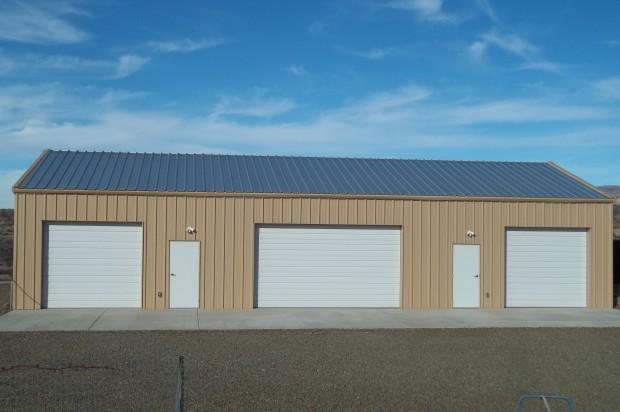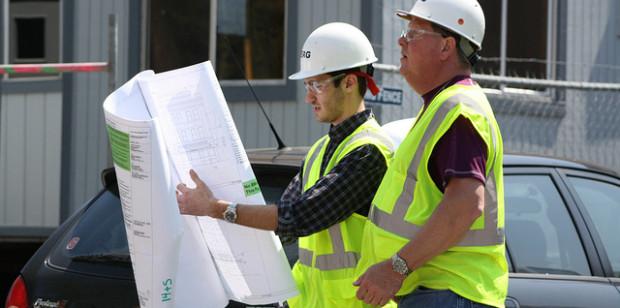10 Things Many Folks Don’t Know About Steel Buildings

When it comes to pre-engineered steel buildings, there are many things non-industry folks don’t know. You’re a first time builder, and that’s OK! But it’s my job to help you gain an understanding so you can make an informed decision. You may know about the durability of steel buildings or the ease of erection, but let me give you some of the lesser known facts to soak up as you begin your project.
1. Plans aren’t just important – they’re everything
Whether you obtain them from a steel building supplier or an architect, one fact remains: you need drawings to start your steel building project, and those drawings aren’t free. A pre-engineered steel building is an engineered system, and drawings (or blueprints, as they used to be called) are made to ensure a building is in complete compliance with the all the correct zoning codes and loads in your area. Remember to consult your county or local municipality to obtain the right codes and loads! You’re responsible for verifying this information, and communicating it to your steel building supplier. Once you receive your drawings by locking in your steel order, you have the option to mark up those drawings, and customize your steel building with accessories such as doors, windows and insulation. After your markup, you’ll receive permit drawings to take back to your county or municipality. Finally, you’ll also receive another set of drawings, construction drawings, when it comes time to erect your building.
2. Educated customers usually make better purchase decisions
 If you want the best purchase experience possible, you should take time to educate yourself about pre-engineered steel buildings. Do you know what tools you need to erect a pre-engineered building or what purpose your building will fulfill? In case you’re wondering, it usually only requires some simple tools. There are plenty of resources on the internet to educate you before you make a purchase.
If you want the best purchase experience possible, you should take time to educate yourself about pre-engineered steel buildings. Do you know what tools you need to erect a pre-engineered building or what purpose your building will fulfill? In case you’re wondering, it usually only requires some simple tools. There are plenty of resources on the internet to educate you before you make a purchase.
3. Steel prices are low…for now
The price of steel, like oil and other commodities, is volatile. In general, steel prices are on a steady rise, but the good news is prices are low right now. It’s projected for the price of steel to rise in 2016. Unfortunately, due to current market conditions, you cannot lock in a steel price.
4. No architect needed
 The specialized knowledge of a structural engineer is all you’ll need to design your pre-engineered steel building. A few fancy lines from an architect on your designs can quickly drive the price up. A structural engineer at a steel building provider has the ability to make any changes to your building design – the same changes an architect can make – for possibly much less. Generally, if an architect is needed, have them design around the steel building design rather than have the steel building supplier design around architectural plans. Some architects aren’t familiar with the engineering or design criteria of specific steel building suppliers.
The specialized knowledge of a structural engineer is all you’ll need to design your pre-engineered steel building. A few fancy lines from an architect on your designs can quickly drive the price up. A structural engineer at a steel building provider has the ability to make any changes to your building design – the same changes an architect can make – for possibly much less. Generally, if an architect is needed, have them design around the steel building design rather than have the steel building supplier design around architectural plans. Some architects aren’t familiar with the engineering or design criteria of specific steel building suppliers.
5. Steel buildings are flexible
Steel buildings aren’t only used for storage buildings. Sure, they make great barns for livestock, feed and other farm supplies. They are amazing garages if you’re a car guy, but they also are suitable as storefronts for small business owners, churches for a pastor and their congregation, and even resident homes. A structural engineer and project manager can design your steel building according to your aesthetic needs too. A pre-engineered steel building can be added onto in the future should the need arise as well. Purchasing a pre-engineered steel building is purchasing the freedom to live out your building dreams.
6. A Broker and a Manufacturer aren’t the same
When you purchase a pre-engineered steel building, who are you buying from? For the best quality building and experience, it’s a good idea to buy from a manufacturer. What is the difference between a manufacturer and broker? A manufacturer has the ability to produce its own pre-engineered steel buildings. A broker doesn’t manufacture their own steel buildings and will take your order and shop it around to the lowest bidder. When you choose to purchase a pre-engineered steel building from a broker, you’re giving up all of the control you have over your building project. You’re forced to wait on a manufacturer they choose, to produce and ship your building to you. Good luck making changes to your design or dealing with missing pieces when your building delivers. Feel free to ask the company you’re working with if it manufactures its own buildings or not.
7. Turnkey Buildings aren’t always helpful
When a contractor or steel building company hears turnkey, they see dollar signs. How can a building salesman give you an honest turnkey price? Have they seen your site? Do they know where you plan to build? Do they know the price of concrete or labor in your area? Any steel building provider who offers turnkey pricing is setting you up for two things – disappointment and unforeseen overages.
8. There’s only a few steps, and less effort for you
The steel building pre-erection process only has about nine steps. We call it the Direct Buy Process. The big steps you’re responsible for are locking in your steel order with a small engineering payment, reviewing your approval drawings, scheduling a delivery time, unloading your building from the truck, and finally doing inventory. While I listed the big parts to be completed by you, it’s a good idea to know all of the steps. You can take a closer look at buying a steel building factory direct here.
9. Steel buildings take time, but…
 It takes time to engineer, fabricate and deliver a pre-engineered steel building. Still, most folks don’t know that a steel building usually is half the cost and can be erected in half the time, compared to traditional construction methods. You can help this process by reviewing and signing any documents in an efficient timeframe and by keeping your expectations reasonable. A pre-engineered steel building is engineered to meet the specific conditions of your job site, and engineers must look at snow loads, wind loads and seismic activity in your area. When you’re ready to purchase a pre-engineered steel building, work with your building supplier to establish a proper timeline for your project. A rushed building project is almost always a bad idea.
It takes time to engineer, fabricate and deliver a pre-engineered steel building. Still, most folks don’t know that a steel building usually is half the cost and can be erected in half the time, compared to traditional construction methods. You can help this process by reviewing and signing any documents in an efficient timeframe and by keeping your expectations reasonable. A pre-engineered steel building is engineered to meet the specific conditions of your job site, and engineers must look at snow loads, wind loads and seismic activity in your area. When you’re ready to purchase a pre-engineered steel building, work with your building supplier to establish a proper timeline for your project. A rushed building project is almost always a bad idea.
10. Savvy consumers purchase in the winter
A savvy consumer will purchase their pre-engineered steel building in the winter with the intention to build once the weather warms up. It’s possible to erect a pre-engineered steel building in the winter, but you may end up spending more money due to various setbacks and added expenses like site maintenance, heat sources for workers and longer projects, due to less daylight. Laying a foundation in winter is another unnecessary challenge because moisture from frost or frozen ground can crack your foundation and sabotage your entire building project. The concrete for your foundation needs to be above 50 degrees Fahrenheit for three to seven days to ensure the concrete maintains its strength and form. Of course, there are ways to lay concrete in the winter, but they just add up to more labor costs and more money out of your pocket. The best way to plan your steel building project is to purchase in the winter and build in the spring or summer. You might even get a break on the price.
Want to learn more about steel buildings, or find out how to begin your own project? Check out more First Time Builder resources!
« What are the Tax Benefits of Steel Buildings?
Work IN Your Business, Not ON Your Business »
Popular Posts

As a contractor, a major concern is acquiring jobs. That’s how you make a living to support your family and pay bills. To win a job, you must present the most attractive bid to a potential customer. Ensuring you have an acceptable bid can be done by eliminating mistakes such as math or clerical errors… …

Family businesses are the backbone of the U.S. economy. They help communities flourish, pay taxes and most importantly, they create jobs. But not all of them last. Have you ever heard of the old cultural proverb, “Going from shirtsleeves to shirtsleeves in three generations?” In China, it’s, “peasant shoes to peasant shoes,” and the British… …

